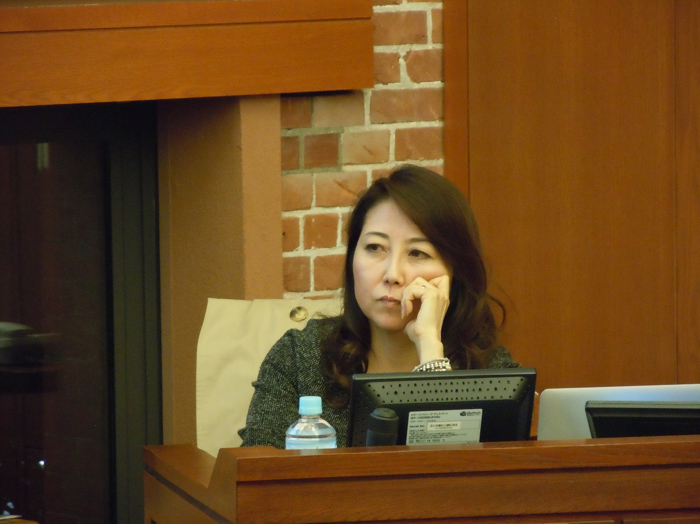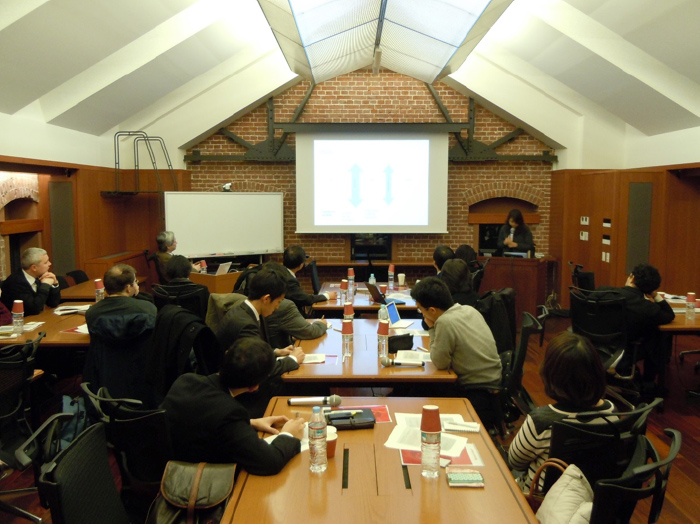SSU Forum with Professor Chiyuki Aoi
| Date: | Wednesday, December 17, 2014, 18:00-19:30 |
|---|---|
| Venue: | Conference Room, 3rd Floor, Ito International Research Center |
| Subject: | Adapting to Stabilisation: Implications for UN Peace Operations Doctrine |
| Lecture: | Professor Chiyuki Aoi, Aoyama Gakuin University |
| Language: | English |
| Hosted by: | Security Studies Unit, Policy Alternatives Research Institute, the University of Tokyo |
The Security Studies Unit was delighted to host Chiyuki Aoi, Professor of International Relations at the Aoyama Gakuin University, who delivered a talk on “Adapting for Stabilisation: Implications for UN peace operations doctrine”, in the framework of the SSU Forum.
The session was chaired by SSU director Professor Kiichi Fujiwara, who introduced the speaker by recalling her numerous contributions in the study of stabilisation and counterinsurgency from both theoretical and operational perspectives. Professor Fujiwara noted that Professor Aoi’s contributions in these areas have also informed her studies on post-Cold war UN missions.
Professor Aoi thanked Professor Fujiwara for the kind introduction and immediately illustrated the topic and purpose of her talk, which was aimed at sharing the fundamental questions of a project she is currently developing, focused on the UN doctrine concerning UN “peace operations”, but particularly on those which intend to achieve the “stabilisation” of countries where violent conflicts occur. The key issue revolves around the formulation of a doctrine which will take into account the ways in which UN operations have changed, both in their conduct and political purpose, in the more recent missions, such as the Democratic Republic of Congo, and in Mali.

She argued that the current UN doctrine, articulated in the 2008 Capstone doctrine, in turn a re-elaboration of the Brahimi Peace Operations reform of 2000, cannot account for shifts that have taken place recently in UN peace operations, and therefore, it is important to review the doctrine in a critical light. She argued that recent peacekeeping missions are doing more than just implementing pre-existing peace agreements, but they may also, for instance, protect civilians despite the lack of a peace agreement, be deployed even in the absence of a political settlement, and incorporate “offensive” mandates.
Of particular importance is the clarification of the idea of “stabilisation”, a term which, despite being used in some UN missions, has not been employed systematically and with a clear doctrinal definition.
Professor Aoi has then proceeded by highlighting possible ways for a better definition of the stabilisation concept. There are several challenges with this task, primarily in identifying the relationship between stabilisation and counterinsurgency. On the other hand, it may be difficult to precisely separate stabilisation from the broader problem of peacekeeping/peace support, although theoretically these two are quite distinct.
It appears finally that stabilisation is in its essence a political process with a political goal, not some sort of non-political, “neutral”, “activity”. This underscores another difficult side of the task of defining stabilisation, namely its dependence on the context in which it has to operate in concreto, particularly when the question of shared consent with local communities, elites, and the various fighting factions is concerned.
Professor Aoi has also underscored the difficulties of managing stabilisation missions without having proper doctrinal guidelines, citing the examples of Bosnia (1992-1995) and Mali (2013). She also highlighted some of the new technologies and methodologies being currently applied in order to mitigate some of these challenges, including in the on-going mission in Mali, with the acquisition of expertise in key tactical and military areas.

-
Aoyama Gakuin University
